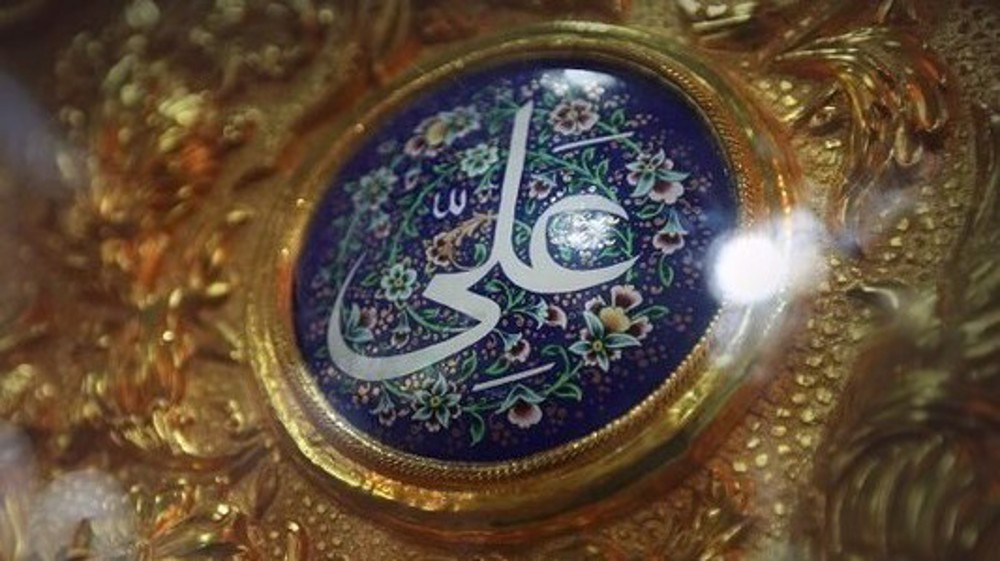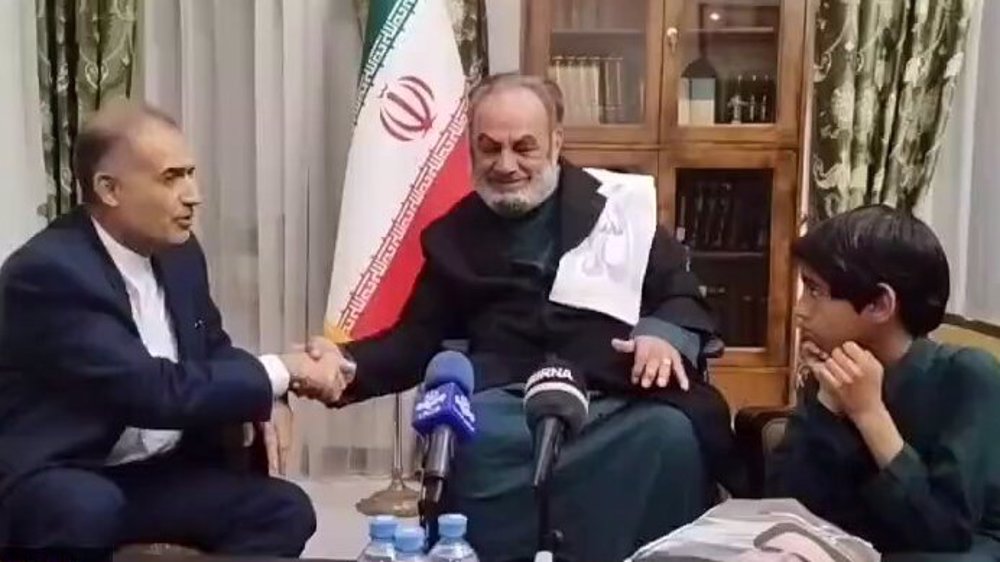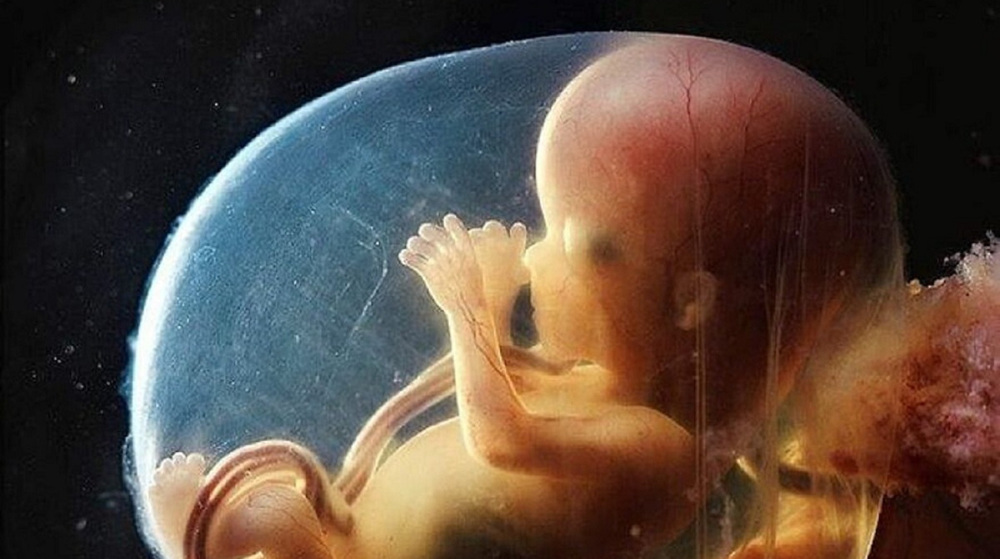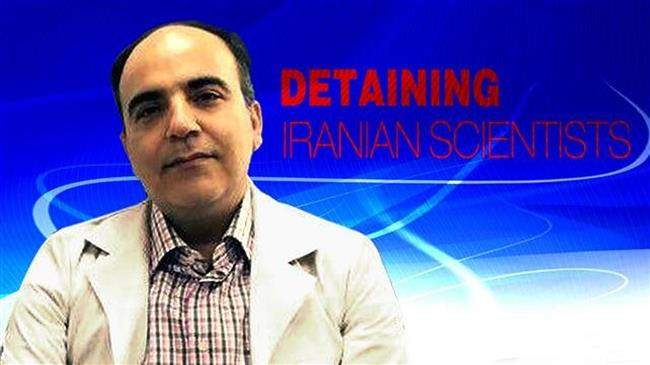US jailing of Iranian stem cell scientist inhumane, hostile: Family members
Dr. Masoud Soleimani’s family has condemned the imprisonment by the United States of the Iranian stem cell scientist as a “hostile” and “inhumane act” meant to pressure Iran’s government, calling for his immediate release.
Speaking during a press briefing at Press TV’s headquarters in Tehran on Tuesday, Soleimani’s wife, Dr. Mahnaz Rabeie, denounced the US for keeping the scientist behind bars for an entire year without any fair trial.
Rabeie rejected a claim that her husband had been arrested for violating US sanctions against Iran, saying the incarceration was politically motivated.
Even if he had violated the bans, keeping him in prison without trial is no way a proportionate punishment, she added.
In a statement issued earlier, Rabeie, along with other members of Soleimani’s family, said the researcher has remained incarcerated in the US without any adequate evidence to convict him.
According to the statement, Soleimani, the full professor and head of the Hematology Department at Tarbiat Modares University was selected as an outstanding faculty member of the year in 2015. He also won recognition as being among the top 1% scientists and researchers on the basis of ISI (Thomson Scientific Institute) in the same year.
Soleimani arrived in the US on October, 22, 2018 with a visa issued upon an invitation by the Mayo Clinic in Minnesota to lead a research program on the treatment of stroke patients.
He was, however, arrested by the FBI, which had a secret indictment, upon arrival at the Chicago airport. His visa was canceled and he was transferred to a jail in Atlanta, Georgia.

Soleimani’s whereabouts remained unknown for up to a week until the Chicago airport police claimed that the professor had returned to Iran on a Qatari flight, said the statement.
“It was a failed attempt that ultimately just revealed the deliberate US move to pretend that Dr. Soleimani is ‘disappeared’ in order to distract the pursuit process. Now, Professor Masoud Soleimani has been held in prison for almost a year without charge and trial. This young scholar, who had no negative or unlawful acts records in his life, was not allowed to be released on bail till his trial. This as his scientific endeavors and research have always been transparent and helpful to humanity, and his conduct and actions are in a very humane and respected way at prison according to the prisoners and guards,” read the statement.
His family also voiced worries about Soleimani’s “poor” mental and physical condition in jail, saying he is suffering from chronic irritable bowel syndrome, has lost 15 kilograms and suffers from severe vision loss.

The statement added that numerous attempts by his family as well as the Interests Section of the Islamic Republic of Iran in the US to provide him with the much-needed medications have been unsuccessful.
Soleimani’s family condemned the US government's hostile act.
"[We] believe the abuse of nationals to oppress their government is an inhumane act and a clear example of human rights violation. The conspiracy by the US government and Mayo Clinic to set up and arrest a scientist, who is expert in his field (stem cells) and has stepped in to help hard-to-cure patients around the world was a purposeful movement, especially when we see he has authored numerous articles in the field. This move is meant to keep a non-American scientist away from science and advancement.”
No sensible person, the family said, approves of this "biased and inhumane behavior."
They demanded that the United States, as a country which claims to advocate human rights and justice, release Soleimani as soon as possible. Insisting on the researcher's innocence, they stated that had there been any evidence against him, his trial would not have been adjourned for a year.
“We call on Iranian and non-Iranian scholars and scientists to protest against the US government and its anti-human rights policies to avoid recurrence of such cases. We also urge them to demand the US government and its legal system to immediately release Professor Masoud Soleimani.," added the statement.
They also urged the government of Iran to pursue this process more seriously, adding that the case did not receive due attention initially and was examined only after six months.
"Meanwhile, the unfortunate death of his mother following the shock of her son’s arrest, made Dr. Masoud Soleimani’s wish to visit his mother unattainable forever,” part of the statement read.
Prosecutors have accused Soleimani, who works in stem cell research, hematology and regenerative medicine, and two of his former students of conspiring and attempting to export growth hormone vials from the US to Iran without authorization, in violation of American sanctions.
They had secretly obtained an indictment against Soleimani in June 2018, prior to his arrival on US soil.
Lawyers for the scientists say no specific license was required for the attempted transport because the hormones are medical materials and that bringing them to Iran for non-commercial purposes does not amount to exporting goods.
The hormone, which is a form of synthetic protein, is not banned in the US or Iran and is being used exclusively for medical research.
The two former students live in the US and are free on bond.
Speaking on Monday, the Iranian Foreign Ministry announced that it had presented to the US a list of detained Iranians whom it wants freed in a possible prisoner swap deal.
Foreign Ministry spokesman Abbas Mousavi said that about 20 Iranians have been detained by the US on “baseless” charges of circumventing US sanctions against Iran, adding that the arrests amount to “kidnapping and hostage taking.”
He also raised concerns about Soleimani’s deteriorating health condition.
Separately on Monday, Iran’s Foreign Minister Mohammad Javad Zarif said he had pursued the case during his recent trip to New York and expressed hope that there would be “good news” about Soleimani in the near future.
Social media activists have also launched a campaign with the hashtag #Free_Masoud_Soleimani to draw global attention to the case of the imprisoned Iranian scientist, one year on.
Jan. 15: ‘Axis of Resistance’ operations against Israeli occupation
VIDEO | US fires: Criticism mounts over govt. failure to respond
VIDEO | Fears, hope in Gaza amid intensified ceasefire efforts
VIDEO | Press TV's news headlines
Hamas: Ceasefire agreement result of steadfastness, resistance in Gaza over 15 months
Hamas thanks Iran, Resistance Front following achievement of ceasefire in Gaza
'Capitulation': Israeli officials and media concede Gaza defeat as truce unfolds
'Gaza has won': Social media users react to ceasefire with mix of relief, joy
















 This makes it easy to access the Press TV website
This makes it easy to access the Press TV website